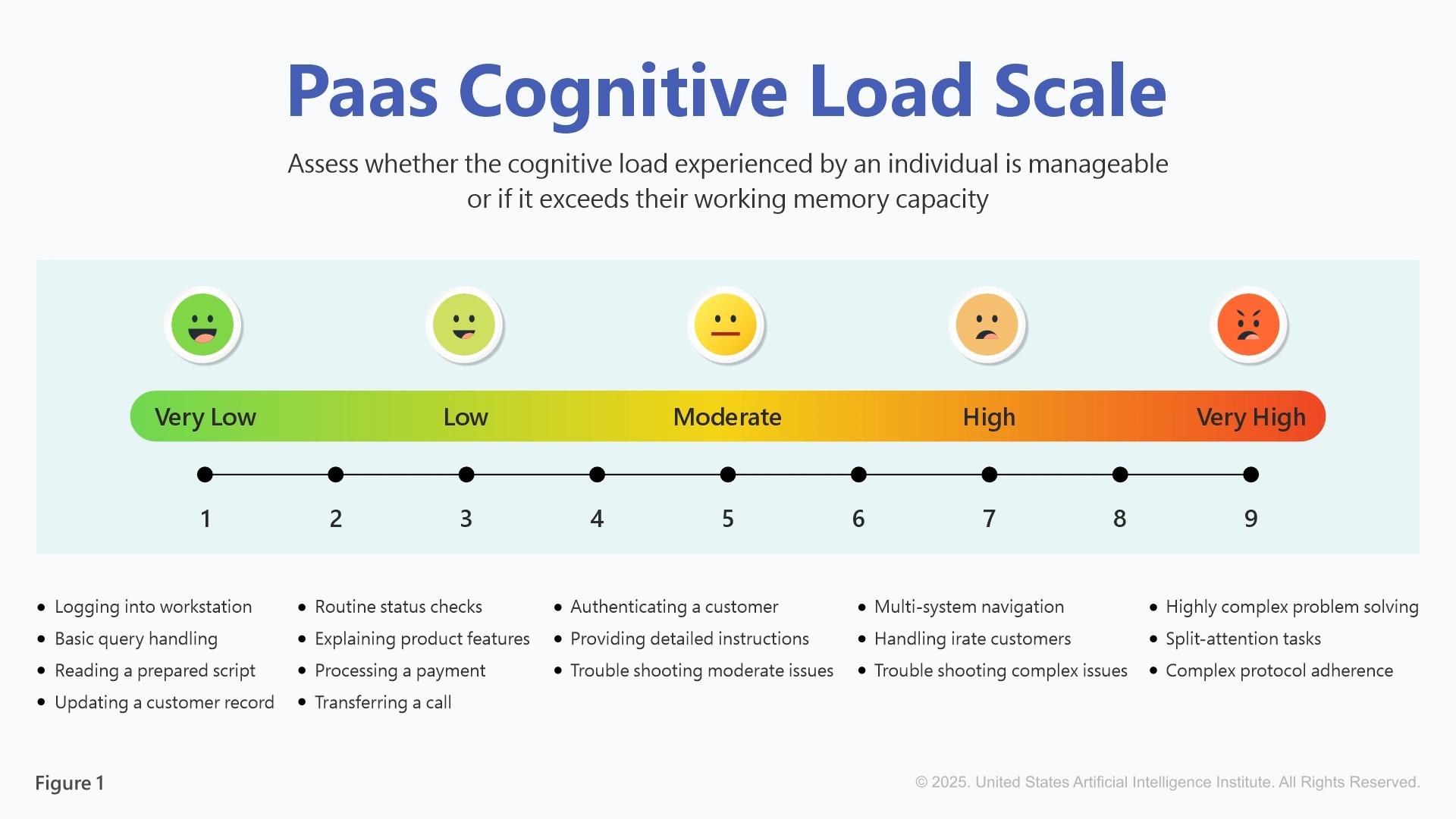
Introduction
Contact centers serve as the foundation of customer support across various industries. The emergence of AI offers exciting opportunities for transforming these essential hubs, enhancing operations, and improving customer satisfaction. The advantages of AI use in contact centers, such as faster response times and the ability to anticipate customer needs, are well-documented. However, a significant yet often overlooked benefit is its ability to reduce cognitive load on human agents.
Understanding Cognitive Load
Cognitive Load Theory, introduced by educational psychologist John Sweller in the late 1980s, emphasizes the limitations of our mental resources. When cognitive load exceeds these limits, performance can decline. Artificial Intelligence (AI) offers innovative solutions that help reduce cognitive load, enabling agents to perform at their best. This article explores how AI alleviates cognitive load in contact centers, allowing agents to reach exceptional performance levels.
Challenges Faced by Contact Center Agents
Every interaction in a contact center requires agents to solve problems quickly, show empathy, and provide clarity while navigating complex information systems and following company protocols. This can place significant mental strain on agents. They must sift through information from multiple sources, such as customer databases, product manuals, and troubleshooting guides. Addressing complex customer issues demands critical thinking and creativity, all while keeping a calm demeanor. Managing customer emotions, particularly in high-stress situations, further depletes cognitive resources. Agents also handle multiple tasks simultaneously, such as handling calls, updating records, and responding to emails—significantly increasing their cognitive load.
A valuable tool for measuring cognitive load is the Paas Cognitive Load Scale, which utilizes a 9- point Likert scale to evaluate perceived mental effort. In healthcare, financial services, telecommunications, and similar industries, customer service agents often report their cognitive load as being between 6 and 8, indicating a high level of mental exertion. A higher cognitive load can result in fatigue and reduced performance if not properly managed. Figure 1 illustrates this scale, highlighting the cognitive load associated with everyday tasks in contact centers.

Negative Impacts of High Cognitive Load
Prolonged periods of high cognitive load can adversely affect call center agents, leading to decreased efficiency, heightened error rates, burnout, and diminished job satisfaction. High cognitive load can hinder an agent's ability to process information and make sound decisions, resulting in longer call handling times and reduced productivity. Strained cognitive resources increase the likelihood of mistakes, such as providing inaccurate information or not fully resolving customer issues. Long-term exposure to high cognitive load can lead to burnout— characterized by emotional exhaustion, depersonalization, and a lesser sense of personal achievement. Constantly managing a high cognitive load can make the job overwhelming and stressful, resulting in lower job satisfaction and higher turnover rates.
AI Solutions to Reduce Cognitive Load
Technologies such as natural language processing, machine learning, and robotic process automation provide solutions to alleviate cognitive load in contact centers. AI enables a lighter cognitive load on agents through several powerful mechanisms:
Benefits of AI Integration
Integrating AI into contact centers offers a powerful solution for reducing the cognitive load on human agents, allowing them to excel in areas where they truly shine. Human agents possess unique strengths in emotional intelligence, empathy, complex problem-solving, and building lasting customer relationships. However, their effectiveness can be diminished by the burden of repetitive and data-intensive tasks. Contact centers can alleviate these ancillary burdens by leveraging AI to manage routine inquiries, process transactions, and retrieve real-time information. This allows human agents to focus on meaningful interactions and creative problem-solving, enhancing agent well-being and customer satisfaction.
AI's ability to quickly analyze large datasets, identify patterns, and provide data-driven recommendations significantly enhances decision-making processes within contact centers. The collaboration between human agents and AI creates a more efficient and effective environment, maximizing each party's strengths. AI ensures consistent performance and high accuracy in repetitive tasks, while human agents bring empathy and personalized service to the forefront. This collaboration improves efficiency and fosters a more satisfying customer experience, demonstrating the transformative potential of AI in the contact center industry.
Conclusion
Cognitive load significantly affects agent performance in contact centers and, ultimately, the customer experience. Multitasking, information retrieval, and emotional management challenges can overwhelm agents, decreasing efficiency and job satisfaction. However, AI technologies offer promising solutions to reduce cognitive load and enhance agent performance. Automated call routing, real-time transcription and analysis, sentiment analysis, knowledge management systems, and predictive analytics are examples of how AI can alleviate cognitive load distraction. Using AI, contact centers can enable agents to concentrate on empathetic communication and problem-solving tasks, enhancing customer satisfaction and agent well-being.
As AI advances, its potential to revolutionize contact center operations and reshape the role of human agents is limitless. Embracing AI is not just about enhancing performance; it's about creating a work environment where people can thrive without the burdens of excessive cognitive load. The convergence of human expertise and AI-powered efficiency represents the future of customer service—where agents and customers benefit from a more streamlined, effective, and satisfying experience.
Follow us: